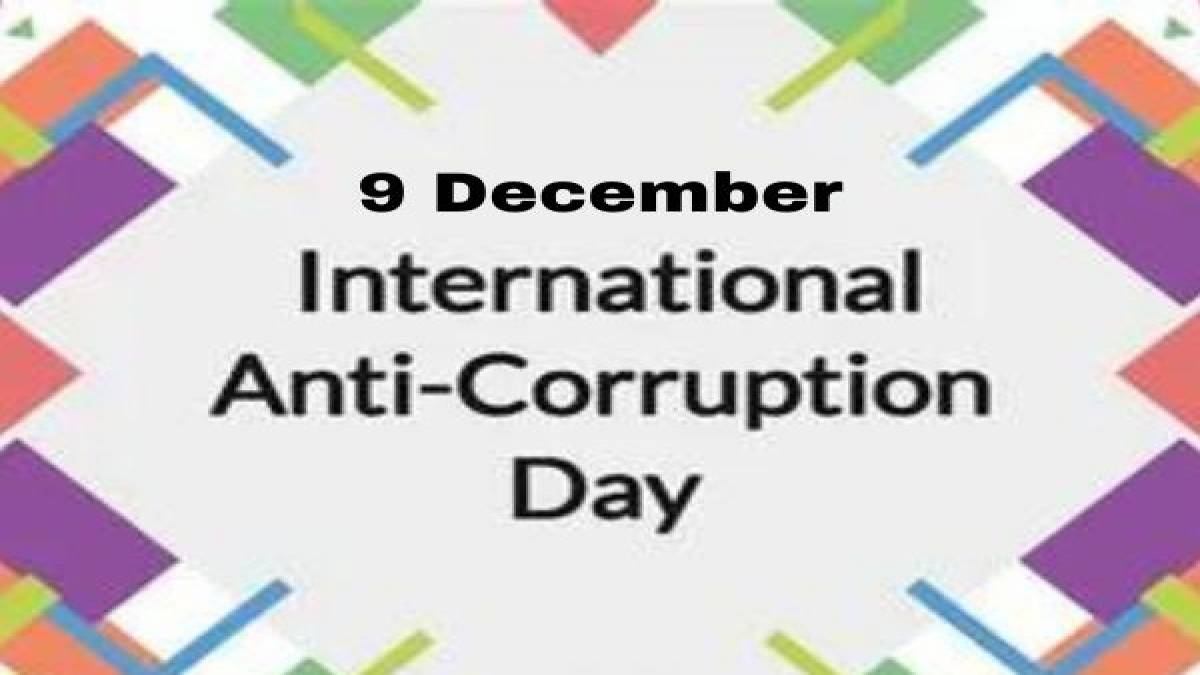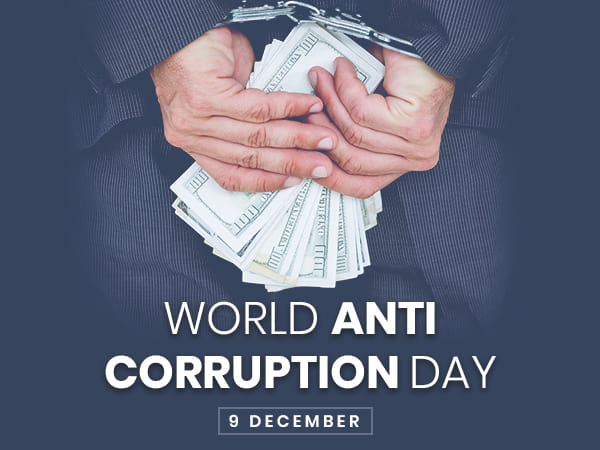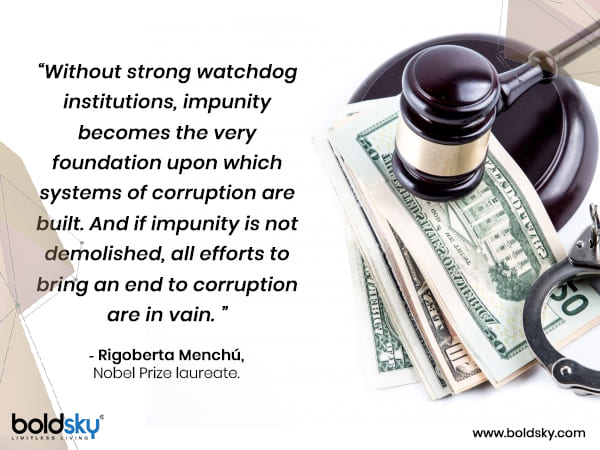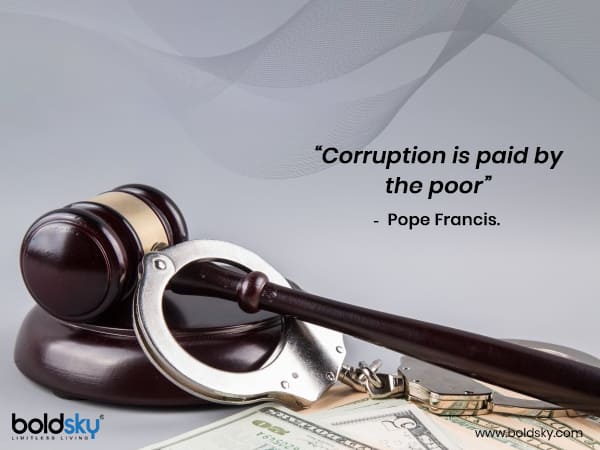Etymologically, the word corruption comes from Latin words- com, meaning "with, together," and rumpere, meaning "to break." So, the basic concept of the word Corruption can be comprehended as one who is indulged in the act of Corruption, breaking the trust and faith of people.
According to the set definitions of Corruption; it is the abuse of entrusted power for private gain. Corruption erodes trust, weakens democracy, hampers economic development, and further exacerbates inequality, poverty, social division, and the environmental crisis.

Overview/Background
Corruption has existed from time immemorial. Some of the earliest records of anti-corruption texts can be found in the Code of Hammurabi of Babylonia, the Great Edict of Horemheb in Egypt, and Arthashastra in India. These texts spoke about bribery practices among officers of the state and law. The concept of public interest and welfare began to gain a stronghold in Western society in the 19th century and more attention was paid to the rising corruption in professional services like the bureaucracy.
In contemporary times, the United Nations Convention Against Corruption, commonly known as UNCAC is the only legal entity to keep an eye on the several acts of corruption across the globe. UNCAC was initiated by the 193 state members of the United Nations (UN) and it has been adopted by the United Nations General Assembly, popularly abbreviated as UNGA, in October 2003 and entered into force in December 2005. The UNCAC works on the simple principle of reducing the various sorts of corruption extensively.

International Anti-Corruption Day Timeline
1754 B.C.- Code of Hammurabi- The Babylonian legal text is one of the earliest, most well-preserved ethical codes governing legitimate state and judicial practices.
331 A.D.- Emperor Constantine Outlaws Corruption- The Roman emperor passed a decree banning corruption.
1995- Corruption Perception Index-Transparency International launches a comparative, global index ranking corruption across countries and regions.
2003- U.N. Convention Against Corruption- The United Nations Convention is signed by 140 countries after the Iraq Oil-for-Food scandal, making it a sanction-able offense.

History of International Anti-Corruption Day
As we know, Corruption is a severe ailment that needs strict diagnosis and regular check-ups. If the act of Corruption is not looked up, it will make the entire nation hollow in every aspect. So, keeping in head the many facets of Corruption, the United Nations-supported for the legal entity to keep an eye on across the globe. The organization is named the United Nations Conventions Against Corruption, commonly abbreviated as UNCAC.
The UNCAC came into effect on 14th December 2005 by the UN members to surveil the act of Corruption throughout the globe. The organization cooperates with the members of the United Nations (UN) to observe the day, i.e.; 9th December as the day to make the public aware of the act of Corruption and to combat it with utmost priority.
International Anti-Corruption Day is observed on 9th December every year. The very essence of celebrating this day is to make the general public aware of the various kinds of corruption and to deal with it in a proper way. The theme of Anti-Corruption Day 2022 is Musicals, plays, keynote speeches, and other activities that focus on fighting against corruption, and hence, help in promoting International Anti-Corruption Day.

Corruption Perceptions Index (CPI) 2021: India Ranks 85th as on Jan 27, 2022
Corruption is a complex social, political and economic phenomenon that affects all countries. Corruption has many detrimental consequences, as democratic institutions slow down the economic development of the nation concerned, which ultimately contributes to administrative instability across the country.
Corruption ambushes the base of democratic institutions by distorting electoral processes, distorting the law. As of now, we have Corruption Perceptions Index (CPI), so; the following observations are made
Transparency International (a German registered association, founded in 1993 by former employees of the World Bank) has released the Corruption Perceptions Index (CPI) 2021 in which, India has been ranked at 85th spot with a Score of 40. The three countries: Denmark, Finland, and New Zealand along with a Score of 88; have excelled in the Ranking this year. This ranking assesses how corrupt each country's public sector is anticipated to be.
The results are given on a scale of 0 (highly corrupt) to 100 (very clean). There were 180 countries that have been positioned in the Corruption Perceptions Index (CPI) in the year 2022. Last year (for 2020), India was ranked 86th with a score of 40. This year's Corruption Perceptions Index (CPI) reveals that corruption levels are at a worldwide standstill. The global average remains unchanged for the tenth year in a row, at just 43 out of 100 points.
Denmark, Finland, and New Zealand topped the list, while Venezuela, Somalia, Syria, and South Sudan were at the bottom of the rankings. The top performers in Asia-Pacific Region are New Zealand (CPI score: 88), Singapore (CPI score: 85), and Hong Kong (CPI score: 76). However, most of the countries were below the global average of Corruption Perception Index (CPI) Score of 43.
This category includes three countries with the lowest scores in the world and they are, Cambodia ( CPI score: 23), Afghanistan (CPI score: 16), and North Korea (CPI score: 16).
The world's most populous countries, such as China (CPI score: 45) and India (CPI score: 40), and other large economies such as Indonesia (CPI score: 38), Pakistan (CPI score: 28), and Bangladesh (CPI score: 26) are among those with lower scores. Such a situation is a matter of concern as the legal entity of the aforesaid nations is at a weaker point, and that needs to be upgraded.
India is a vast country that has developing aspects in every sphere. So, the chances of corruption in India are also high. To scrutinize the act of corruption and bribery, India has taken the following steps that are worth bearing in mind:
Though the Central Vigilance Commission was designed in the year 1964, it became an independent statutory body only in 2003 by an Act of Parliament. Its role is to govern the vigilance administration and advise and assist the executive in matters related to corruption.
Right to Information Act, 2005, the Prevention of Corruption Act, the Judges (Inquiry) Act, the Lokpal and Lokayukta Act 2013, the Whistleblowers Protection Act 2011, the Prevention of Money Laundering Act, Benami Transactions (Prohibition) Act, etc. are some of the prominent legislations that concerns corruption.
The Indian Government also done ratification of the United Nations Convention Against Corruption in 2011 to probe into the indulgence of corruption.
India has also introduced e-governance and direct benefit scheme for the rectification of the act of corruption.

UNCAC Acts As a Viaduct to Unite the Nations Across the Globe
The world today is facing some of its greatest challenges:- challenges that threaten prosperity and stability for people across the globe. The plague of corruption is intertwined and is significant in most of the challenges.
Corruption is intertwined with conflict and instability; jeopardizing social and economic development and undermining democratic institutions and the rule of law. It has negative impacts on every aspect of society and hence, needs to be checked regularly and continuously.
Corruption is the root cause of many conflicts. It fuels conflict and hinders peace processes by undermining the rule of law, worsening poverty, facilitating the illicit use of resources, and providing finance for armed conflict.
Preventing corruption, promoting transparency, and strengthening institutions are crucial if the targets foreseen in the Sustainable Development Goals are to be achieved.
India's Rank in Global Index 2021-2022
Global Drug Policy Index 2021: 18th
Climate Change Performance Index 2022: 10th
2021 TRACE global Bribery Risk Rankings: 82nd
World Talent Ranking report 2021: 56th
Global Health Security Index 2021: 66th
5th Truecaller's Global Spam & Scam Report 2021: 4th
Hurun's Global Unicorn Index 2021: 3rd
2019 Anti-Doping Rule Violations (ADRVs) Report: 3rd
Henley Passport index 2022: 83rd



 Click it and Unblock the Notifications
Click it and Unblock the Notifications



























